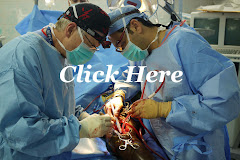The following article was written in 2008 by JB Forbes, a reporter/photographer for the St Louis Post/Dispatch who accompanied Dr Nelson and his team on one of their quarterly trips to Cap Haitien. Although the trip took place prior to the Big Quake, operating conditions were very similar to now in Port au Prince. Cap Haitien had recently endured Hurricanes Gustav, Hanna, and Ike and its infrastructure was battered making operative conditions (frequent power outages, limited water supply) equally challenging.
I recently spent a week at Justinien Universitaire Hospital, the general hospital in Cap Haitian, Haiti. Fortunately, I was not there as a patient. No one should suffer that fate. I was asked by my friend Dr Howard Place, professor of orthopedic surgery at St Louis University Hospital, to accompany him and his 16 year-old son, Greg, as part of a team of people going to the hospital to help the people of that region.
Dr Place was going to the hospital at the request of Dr Scott Nelson, another orthopedic doctor who is based in the Dominican Republic. Dr Nelson is sponsored by CURE International, a nonprofit organization that helps the poor in third world countries. Dr Nelson makes trips to Hospital Justinian four times a year to operate for free on broken bones. He never has a shortage of people in need. From his hospital in the Dominican, Dr. Nelson brought three nurses and a fifth year resident, Dr Sam Chen, to complete his operating team.
In four days, the team did 36 operations in less than perfect conditions. The hospital usually has about four hours of electricity a day. Fortunately, a non-profit group added battery power to one of the three operating rooms so that the doctors could continue working even though it meant opening the windows to let a breeze blow through the hot operating room, along with a few more flies.
The doctors find this kind of surgery challenging because they are not used to seeing such old injuries and deformities in the United States as they do in Haiti. Poor Haitians will sometimes wait months, if not years to get broken bones and club feet fixed. When they come to the hospital, they have to bring their own sheets, pillows, medicine, food and water. Many have trouble paying for the x-ray needed to diagnose their injuries. Infection is often one of their biggest threats. Dr Place had to tell three different families that their children would never walk again because they had suffered severe back injuries. But he implored the families to take good care of their injured family members because it was so easy for them to get bed sores and infection.
While we were there, one woman went into septic shock and died just hours after a doctor changed the bandage on her infected, broken arm.
The doctors spent many long hours fixing broken bones and saving lives. My job was to help in any way I could – and to take pictures. So, I scrubbed floors between operations and then photographed the doctors doing their lifesaving work. Dr. Place’s son, Greg, and I made a trip to the street market in the center of the city. We both had trouble getting past the smells and the flies and the begging.
A trip to Haiti certainly makes you appreciate everything we have here in the United States, but it also makes you wonder why a country so close to ours seems to be so forgotten except by all the non-profit organizations. Thankfully, doctors such as Dr Place, Dr Nelson and Dr Chen see the need for helping those less fortunate.The doctors could use our help. All of Haiti needs our help.














No comments:
Post a Comment